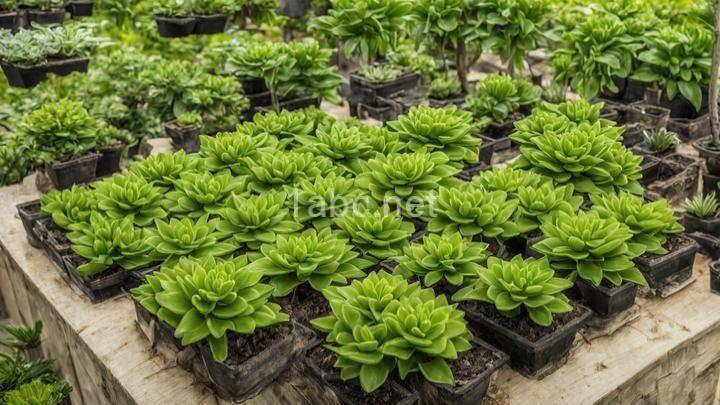Organic Soil Amendments: Boosting Nutrients for Stunning Garden Ornamental Plants

Introduction:
Hello, fellow garden enthusiasts! Welcome to the world of organic soil amendments, where we delve into the secrets of growing vibrant and breathtaking garden ornamental plants. In this blog post, we will explore various organic soil amendments that can boost nutrients and enhance the growth of these plants, making your garden the envy of the neighborhood.
I. Why Choose Organic Soil Amendments?
When it comes to nurturing our plants, it's essential to choose the right soil amendments. Organic soil amendments offer a plethora of benefits over their synthetic counterparts. Not only do they improve soil structure and increase water retention, but they also promote beneficial microbial activity. These amendments are packed with nutrients that are slowly released into the soil, providing a long-lasting nourishment for your plants. What's more, organic amendments are safe for the environment, pets, and children, ensuring a healthy and sustainable gardening experience.
II. Types of Organic Soil Amendments:
A. Compost:
Ah, compost, the black gold of the gardening world! This magical substance is a rich source of nutrients, humus, and beneficial microorganisms. When incorporated into the soil, compost improves its fertility, enhances plant growth, and reduces the risk of diseases. You can create your own compost by recycling kitchen scraps, yard waste, and other organic materials, or you can purchase high-quality compost from your local garden center. Whichever route you choose, your plants will thank you for the nutrient boost!
B. Manure:
If you're looking for a tried and true organic soil amendment, look no further than well-aged animal manure. Cow, horse, and chicken manure are commonly used in gardening, each offering different nutrient content. Manure enriches the soil with essential nutrients, improves its structure, and enhances microbial activity. However, it's important to handle manure with care and apply it properly to avoid burning your precious plant roots. A little goes a long way!
C. Worm Castings:
Now, let's talk about the humble earthworm and its castings. Worm castings are nature's way of giving us a nutrient-dense soil amendment. These tiny, nutrient-packed pellets enrich the soil with essential nutrients and beneficial bacteria, creating a thriving environment for your plants. You can incorporate worm castings into your garden beds or use them in potting mixes for container plants. Your plants will thank you for the wormy goodness!
D. Bone Meal:
For plants that crave phosphorus and calcium, bone meal is the go-to organic amendment. Derived from ground animal bones, bone meal promotes root development, flowering, and fruiting. It's a natural source of essential nutrients that your plants will love. However, it's important to exercise caution when using bone meal near pets or wildlife, as they might mistake it for a tasty treat. Safety first, folks!
III. Application Techniques:
A. Topdressing:
One popular technique for applying organic soil amendments is topdressing. This involves spreading the amendments on the soil surface around your plants. Topdressing offers several advantages, including slow nutrient release, improved soil structure, and weed suppression. To topdress, simply sprinkle the amendments around your plants, making sure to avoid direct contact with the plant stems. Mother Nature will take care of the rest!
B. Incorporation:
Another technique is incorporation, which involves mixing the organic amendments into the soil before planting. This ensures that the nutrients are readily available to your plants, giving them a head start in their growth journey. To incorporate amendments, dig them into the soil at the recommended depth, making sure to distribute them evenly throughout the planting area. Your plants will thank you for the nutrient-rich home!
IV. Maintenance and Precautions:
To maintain a thriving garden, it's important to regularly test your soil to monitor nutrient levels and adjust your amendment applications accordingly. Soil testing kits are readily available at garden centers and can provide valuable insights into your soil's composition. Additionally, it's crucial to follow the package instructions for each type of organic amendment to ensure optimal results. Lastly, don't forget to practice good hygiene when handling organic materials, such as wearing gloves, to protect yourself and prevent the spread of any potential pathogens.
Conclusion:
Congratulations, you're now equipped with the knowledge of organic soil amendments and their magical benefits for your garden ornamental plants! By choosing organic amendments, you not only provide the nutrients your plants crave but also create a sustainable and eco-friendly gardening environment. So go ahead, experiment with different types of organic amendments based on your plant's needs, and watch your garden flourish. Feel free to share your experiences or ask any questions you may have. Happy gardening!
Disclaimer: While we strive to provide accurate and up-to-date information, it's always wise to consult with local gardening experts or extension services for specific advice tailored to your region and plant species. Happy growing!
FREQUENTLY ASKED QUESTIONS
What are organic soil amendments?
Organic soil amendments are natural substances that are added to soil to improve its fertility, structure, and overall health. These amendments are derived from plant, animal, or mineral sources and are free from synthetic chemicals or pesticides.Common examples of organic soil amendments include compost, manure, bone meal, blood meal, seaweed, and peat moss. These amendments provide essential nutrients, improve soil structure, enhance water retention, promote beneficial microbial activity, and increase organic matter content.
Compost, for instance, is made from decomposed organic matter such as kitchen scraps, leaves, and grass clippings. It enriches the soil with nutrients, improves drainage, and enhances its ability to retain moisture. Manure, on the other hand, is rich in nitrogen, phosphorus, and potassium, which are essential for plant growth.
Bone meal and blood meal are derived from animal sources and are valuable sources of phosphorus and nitrogen, respectively. These amendments are often used to promote strong root development in plants.
Seaweed is a fantastic organic soil amendment as it is rich in minerals and trace elements. It helps improve soil fertility and stimulates plant growth. Peat moss is commonly used to improve soil structure, increase water retention, and enhance aeration.
By incorporating organic soil amendments into your gardening practices, you can create a healthy and sustainable environment for your plants to thrive. These amendments not only provide essential nutrients but also support the long-term health of the soil ecosystem.
Why should I use organic soil amendments?
Organic soil amendments offer numerous benefits that make them worth considering for your gardening needs. Here are a few reasons why you should use organic soil amendments:
-
Enhanced Soil Health: Organic soil amendments, such as compost, help improve soil structure, water-holding capacity, and nutrient availability. By adding organic matter to your soil, you can create a fertile environment that supports healthy plant growth.
-
Sustainable and Environmentally Friendly: Using organic soil amendments aligns with a sustainable approach to gardening. These materials are derived from natural sources, such as plant and animal waste, and are free from synthetic chemicals or genetically modified organisms (GMOs). By opting for organic options, you contribute to the overall health of the environment.
-
Nutrient-Rich Soil: Organic soil amendments are packed with essential nutrients that plants need to thrive. They provide a slow-release of nutrients, ensuring a steady supply over time. This can help reduce the risk of nutrient imbalances and nutrient leaching.
-
Improved Water Retention: Organic matter in the soil acts like a sponge, aiding in water retention. This means that your plants can access water more effectively, reducing the need for frequent watering. Additionally, better water retention can help prevent soil erosion.
-
Beneficial Soil Microorganisms: Organic soil amendments support the growth of beneficial soil microorganisms, such as bacteria and fungi. These microorganisms play a vital role in breaking down organic matter, releasing nutrients, and suppressing harmful pathogens. They create a balanced soil ecosystem that promotes plant health.
-
Long-Term Soil Improvement: Regularly incorporating organic soil amendments into your gardening practices can lead to long-term soil improvement. Over time, the organic matter enriches the soil, making it more fertile and resilient. This can result in stronger, healthier plants that are better able to resist pests and diseases.
Remember, when using organic soil amendments, it's essential to choose high-quality products and follow the recommended application rates. By doing so, you can maximize the benefits and create an environment where your plants can thrive naturally.
What types of organic soil amendments are available?
There are several types of organic soil amendments available that can improve the quality and fertility of your soil. Some common options include compost, manure, peat moss, vermicompost, and bone meal.Compost is a popular choice as it is made from decomposed organic matter such as kitchen scraps and yard waste. It enriches the soil with nutrients and improves its structure, drainage, and water-holding capacity.
Manure, whether it be from cows, horses, chickens, or other animals, is another effective soil amendment. It provides essential nutrients and enhances microbial activity in the soil.
Peat moss is a type of decomposed plant material that can increase the organic matter content of your soil. It helps retain moisture and improves soil structure.
Vermicompost is created by worms breaking down organic matter. It is rich in nutrients and beneficial microorganisms, making it an excellent choice for improving soil health.
Bone meal is a natural fertilizer made from crushed or ground animal bones. It is high in phosphorus, which promotes root development and flowering in plants.
These are just a few examples of organic soil amendments available. The choice of amendment depends on your specific soil needs and the plants you are growing. It's always a good idea to test your soil and consult with a local gardening expert to determine the best amendment for your garden.
How do I apply organic soil amendments?
Applying organic soil amendments is a great way to improve the health and fertility of your soil. There are a few different methods you can use to apply these amendments, depending on the specific needs of your garden. Here are some steps to help you get started:
-
Assess your soil: Before applying any amendments, it's important to understand the current state of your soil. Test its pH level and nutrient content to determine which amendments will be most beneficial.
-
Choose the right amendments: Organic soil amendments can include compost, manure, leaf mold, and various other organic materials. Consider the specific needs of your plants and choose amendments that will address those needs. For example, if your soil is lacking in nutrients, compost or well-rotted manure can provide the necessary organic matter and nutrients.
-
Prepare the area: Clear away any debris or weeds from the area where you'll be applying the amendments. Loosen the soil with a garden fork or tiller to ensure better absorption of the amendments.
-
Spread the amendments: Depending on the type of amendment you're using, spread a layer of it evenly over the soil surface. Use a rake or garden fork to work the amendments into the top few inches of soil. Be sure to follow the recommended application rate for the specific amendment you're using.
-
Water the area: After applying the amendments, water the area thoroughly to help them settle into the soil. This will also help activate the beneficial microorganisms in the amendments and aid in the decomposition process.
-
Monitor and adjust: Keep an eye on your plants and monitor their growth and health. If needed, you can apply additional amendments throughout the growing season to maintain optimal soil conditions.
Remember, organic soil amendments are a long-term solution, so be patient and give them time to work their magic. By regularly incorporating these organic materials into your soil, you'll be promoting a healthy and sustainable garden environment. Happy gardening!


